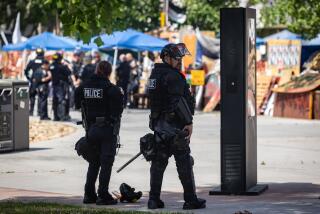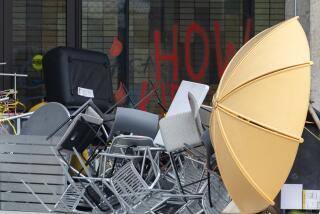Go Slow, Ex-Generals Urge China’s Leaders : Avoid Force on Protesters, Letter Advises
- Share via
BEIJING — As a tense standoff between residents of Beijing and the Chinese army continued Monday, key retired generals were reported to have written a letter urging restraint and avoidance of force in suppressing massive protests.
The letter, copies of which circulated widely in Beijing on Monday, was drafted by seven retired generals, including former Defense Minister Zhang Aiping and former army Chief of Staff Yang Dezhi, and appeared to be genuine, according to a number of well-placed individuals who spoke with Western reporters.
Some Chinese also said that a copy of the letter, signed as a petition by about 100 military officers, was submitted to the official People’s Daily newspaper.
A month of student-initiated pro-democracy protests that grew into demands for the resignation of Premier Li Peng and senior leader Deng Xiaoping have plunged China into crisis, with the ultimate succession to the 84-year-old Deng at stake. Li declared martial law Saturday, but resistance by Beijing citizens, who set up street blockades, has prevented the army from entering the city.
Since the student protests grew to a mass movement across China, the question of the army’s willingness to crack down on ordinary citizens has been a central topic. There have been reports of some army officers refusing to commit their men to duty controlling demonstrations, which they see as a political rather than military function. The retired generals’ letter was a further indication that the army may be unwilling to put down the protests.
Reformist Leader Speaks Out
National People’s Congress Chairman Wan Li, a key reformist leader now on a North American tour, made a speech in Toronto on Monday that appeared critical of the decision to declare martial law.
Wan said at a dinner hosted by ethnic Chinese that the desire of student demonstrators to promote democracy and clean up corruption “is entirely consistent with the position and goal of the Chinese government,” the official New China News Agency reported.
The retired generals’ letter, addressed to Beijing martial-law headquarters and the Central Military Commission, declared:
“Considering that the present situation is extremely serious, we, in the name of old military men, raise the following demands: The People’s Army belongs to the people, and it must not stand against them. Even more certainly it must not suppress the people, and it absolutely cannot open fire upon the people. An incident of bloodshed absolutely must not be caused. In order to prevent deterioration of the situation, troops must not enter the city.”
The struggle over whether troops should force their way into Beijing reflected a battle for political power pitting Premier Li against Communist Party General Secretary Zhao Ziyang, who opposed the attempted crackdown. Zhao reportedly has submitted his resignation, but diplomats and Chinese who spoke with Western reporters Monday said it appeared that Zhao is still battling to reassert his authority.
At many points around the city, army trucks and armored personnel carriers remained in position through the night, unable to pass citizen-erected barriers of parked buses, trucks and concrete pipes without using violence against the protesters blocking their way.
But in suburban Fengtai, on the southwest side of Beijing, a violent clash erupted late Monday evening, with police and soldiers attempting to force their way past citizens manning barricades to keep them out of the city.
At the central railway station Monday afternoon, about 1,500 soldiers, armed with AK-47 automatic rifles, sat looking bored and tired. Student protesters harangued them through a battery-powered loudspeaker from a second-floor window of the station, repeatedly reading the retired generals’ letter.
Chinese sources not directly associated with the student-led demonstrations told Western reporters that the letter being distributed by the students is genuine and that it had been sent to the People’s Daily.
Chinese journalists told Western reporters that they believe that the letter is genuine and that a pro-Zhao faction in the party newspaper wanted to publish it.
Chinese who spoke with diplomats and Western journalists also indicated that Zhao is seeking to reassert authority over Li, who has been the key target of protesters’ anger since the declaration of martial law. During huge demonstrations last week, many protesters demanded the resignations both of Li and Deng.
A reporter for United Press International witnessed the late Monday clash in suburban Fengtai, and several Chinese witnesses described it to Western reporters.
Soldiers and paramilitary police, some bearing AK-47 assault rifles, used truncheons to clear a path through the crowd to allow a convoy of armored personnel carriers and trucks to pass.
Much of the convoy of about 70 armored personnel carriers and 300 trucks, stalled since Friday night by barricades of trucks, furniture and demonstrators, drove to a military camp about one mile closer to the center of the capital. Thousands of people rushed the camp’s gate and began throwing rocks at windows and soldiers inside.
Minutes later, soldiers charged out of the encampment in formation, armed with bricks and rocks, and with a battle cry rushed the students and workers and another clash erupted.
Soldiers ran through the streets breaking shop and home windows as one group of students chanted “Down with violence!” UPI reported. The news agency’s correspondent reported that he was forced to take shelter in a shop whose windows were shattered by rocks and bricks thrown by troops.
At least 40 people were injured in the clash, witnesses said.
A Beijing official, Su Zhongxiang, said later on state television that “criminals and hooligans” were endangering the public order and some arrests had been made. No details were given.
Late Monday evening, the New China News Agency carried a brief report that appeared aimed at easing tensions.
“The troops of the People’s Liberation Army ordered to carry out martial-law tasks are still stopped in the suburbs,” the official news agency reported. “Some college students and residents sent food and drinks to the army men, and they talked with each other harmoniously. It is learned that the troops have been educated to ‘love Beijing, Beijing people and young students.’ Some army men told students and citizens that the People’s Army always loves the people.”
Some students and city residents manning barricades this morning expressed cautious optimism that the army--estimated to number about 20,000 to 40,000 in trucks and armored personnel carriers encircling Beijing about 10 to 20 miles from the city center--may never make it to downtown Tian An Men Square, where about 30,000 student protesters were still camped this morning.
At one barricade, at the suburban Liuli Bridge in the Fengtai area, about 20 army trucks turned around and drove away at about 4:30 a.m., to the applause of hundreds of citizens who had blocked their way. Some soldiers shook hands with the protesters as they pulled out.
One protester said, as to a departing guest, “We welcome you to visit again.”
Another shouted out: “Long live democracy!”
“This shows that there is dissension at the top,” one student said.
“It’s good for now, but we can’t guarantee they won’t come back,” said another.
At another barricade, a student stated flatly: “The army can’t suppress the people.”
Asked whether that meant he was confident the troops would not fight their way into the city, however, he said he was not sure.
“Soldiers,” he said, “have to follow orders.”
U.S.-CHINA CONTACT--Vice President Quayle urges nonviolent solution. Page 15
ANXIOUS STUDENTS--Tumult at home grips the attention of Chinese students in Claremont. Metro, Page 3
PROTEST FOOTAGE--China tapes ferried to Hong Kong, Tokyo. Calendar, Page 1
More to Read
Sign up for Essential California
The most important California stories and recommendations in your inbox every morning.
You may occasionally receive promotional content from the Los Angeles Times.













